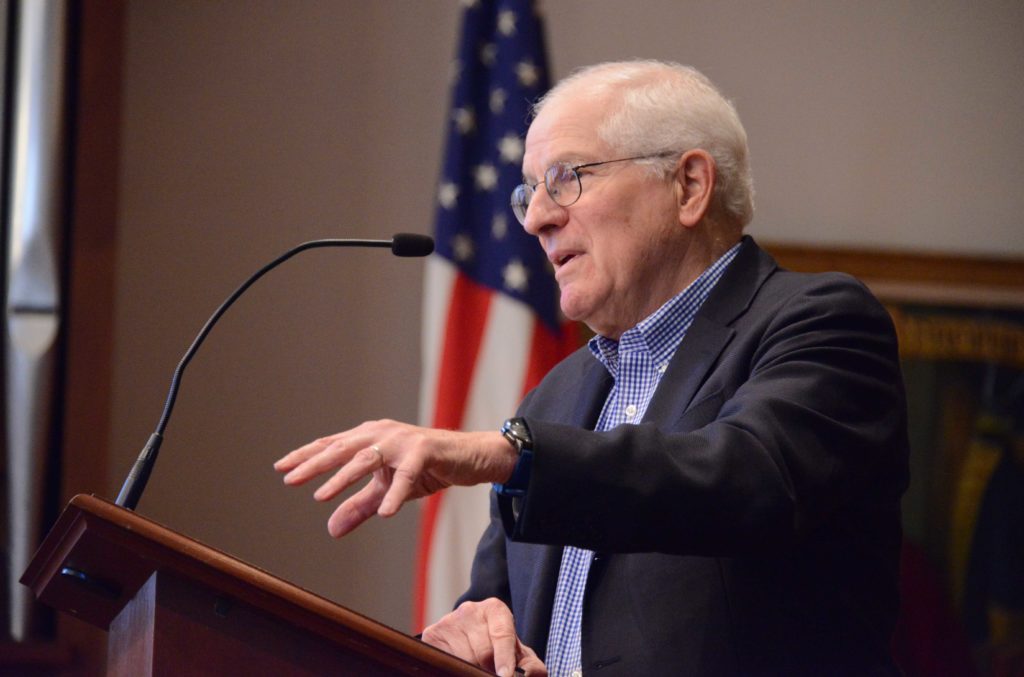Dr. William Taubman Delivers 16th Annual Jarvis Lecture
On October 15, Professor Bill Taubman—Bertrand Snell Professor of Political Science, Emeritus, at Amherst College—visited campus as this year’s Jarvis International Fund Lecturer. This year marks the sixteenth annual Jarvis Fund Lecture, named for the Reverend Tony Jarvis, who for thirty years led Roxbury Latin as its 10th Headmaster.
Dr. Taubman (former professor of Headmaster Kerry Brennan) has a long and illustrious academic career as a “Sovietologist,” focused on the former Soviet Union, its politics and foreign policy. Drawn to a historical approach to political science, to addressing large and enduring questions—such as the nature of revolution, sources of tyranny, perils of reform, and the impact of leaders and their personalities—Dr. Taubman offered students and faculty in Hall a historical insight to understanding current global events, especially pertaining to Russia and the former Soviet Union.
“I’ve been asked to talk with you this morning about how the Soviet Union got to be the Russia that we know today; about the role of key figures like Gorbachev and Putin; and about U.S.-Russian relations under Putin and Trump,” Dr. Taubman began. “To understand this, you have to go back—way back, to Russia before it became the Soviet Union; to the rise and fall of the Soviet Union itself; to the early hopes in post-Soviet Russia for democracy and a partnership with the United States; and to how Putin led the way to back to authoritarianism at home and a new cold war abroad.”
“There are two big things I want you to know about Russian history over those many centuries,” he continued. “The first is that Russia was ruled by an authoritarian regime. A czar at the top—no rule of law, no constitutional norms…, practically no experience with civic activity, hardly any tradition of democratic self-organization. And the second thing about Russia is the effect of this rule on the Russian people’s view of themselves—that they themselves couldn’t really be trusted to govern themselves and needed to be governed by a strong czar.”
“Now, Soviet Communism, introduced in 1917, was supposed to change all of this, but actually it had the effect of intensifying it. The aim was to create Communism—full equality, full democracy, in effect heaven on earth—but Russia wasn’t ready for that. If any place actually is, which is another big question to discuss.”
Professor Taubman walked students and faculty through a concise but effective lesson in Soviet history, including the leadership and lasting impacts of Lenin, Stalin, Khrushchev, Brezhnev, Gorbachev, and Yeltsin; the differences between authoritarianism and totalitarianism; efforts to reform the Soviet Union; the Cold War; historical patterns; and what we might expect in the future. Dr. Taubman then answered questions from students about U.S-Russian relations today; about the United States’ role in spreading democracy around the world; the potential of another Cold War between the U.S. and Russia; NATO; and the current situation in Turkey.
Dr. Taubman has earned a number of awards and honors over his career, including a Guggenheim Fellowship and National Endowment for the Humanities Fellowships. His biography of Nikita Khrushchev, Khrushchev: The Man and His Era, was the first comprehensive and scholarly biography of Stalin’s successor. The book won both the Pulitzer Prize and the National Book Critics Circle Award for biography. His latest book, Gorbachev: His Life and Times, chronicles Mikhail Gorbachev’s rise and how his liberal policies ended the Cold War. Dr. Taubman travelled to Russia several times with his wife, retired Amherst College professor of Russian Jane Taubman, to meet and interview Gorbachev.
Established in 2004, the F. Washington Jarvis International Fund Lecture has brought to campus several distinguished public servants and thinkers on foreign affairs—including economist Paul Volcker; Roxbury Latin alumni Ambassadors Richard Murphy and Mark Storella; Robert Gates, former Secretary of Defense; Lisa Monaco, homeland security advisor to President Obama; and, last year, John Brennan, former Director of the CIA. The fund is a generous benefaction of Jack Hennessy, Class of ’54, and his wife, Margarita. The Hennessys have, throughout their lives, represented an unusual engagement with other nations and cultures. Throughout their lives, too, they have generously provided the philanthropic wherewithal in order that others might come to know and appreciate our broader world. Through their generosity, hundreds of Roxbury Latin boys and masters have been afforded the opportunity to travel to foreign countries over the years, developing new perspectives on many political, economic, historical, and cultural issues.

